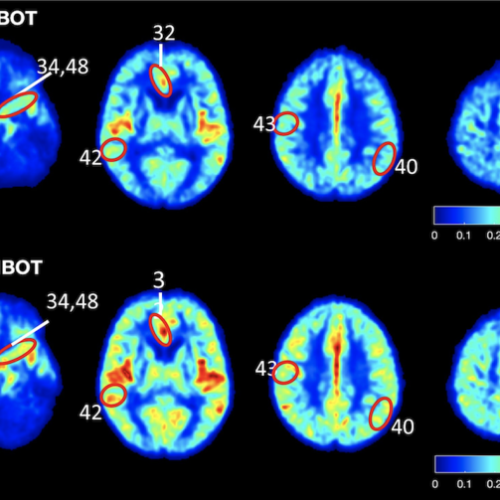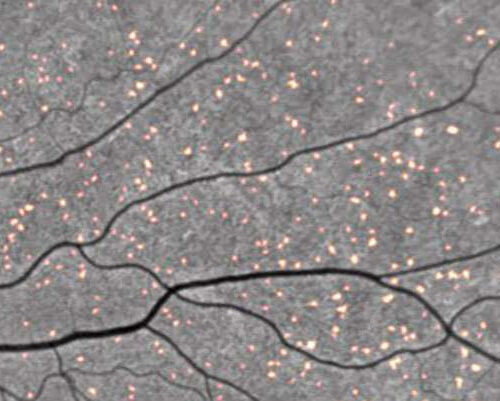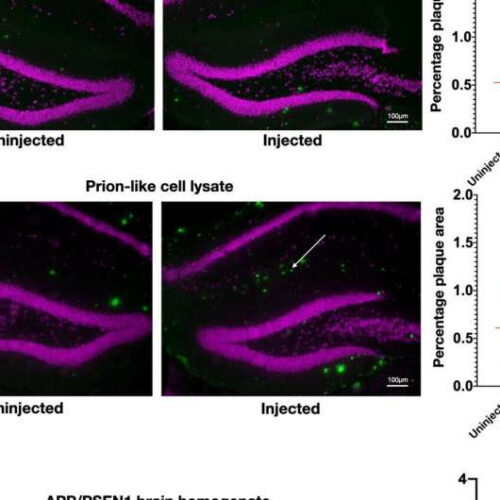IMAGE: STUDY RESULTS SHOW ELEVATED BLOOD FLOW AND IMPROVED OXYGENATION IN THE BRAIN OF PATIENTS SUFFERING FROM COGNITIVE IMPAIRMENT CREDIT: TEL AVIV UNIVERSITY (TAKEN FROM THE ARTICLE). Scientific Breakthrough: A team of investigators from Tel Aviv University has succeeded in restoring brain trauma by hyperbaric oxygen therapy (HBOT). This is the first time in the...
Tag: <span>Alzheimer’s disease</span>
Biomarker predicts cognitive decline in Alzheimer’s disease
by Marla Paul, Northwestern University Credit: CC0 Public Domain A biomarker in the brain predicts future cognitive decline in patients with the language form of Alzheimer’s disease (AD), reports a new Northwestern Medicine study. Northwestern Medicine scientists discovered the buildup of tau protein in the brain predicts the amount of future cognitive decline over one year...
First study to investigate the role of RNA tags in Alzheimer’s disease
by Boston University School of Medicine Credit: Pixabay/CC0 Public Domain Understanding the role of tau protein in Alzheimer’s disease (AD) has led to new ways to diagnose it as well as the creation of medicines now in clinical trials to treat it. Misfolding and aggregation of microtubule associated protein tau (MAPT) are core features of AD....
Brain tissue inflammation is key to Alzheimer’s disease progression
UNIVERSITY OF PITTSBURGH IMAGE: ASSISTANT PROFESSOR OF PSYCHIATRY AND NEUROLOGY, UNIVERSITY OF PITTSBURGH SCHOOL OF MEDICINE. CREDIT: THARICK PASCOAL PITTSBURGH, Aug. 26, 2021 – Neuroinflammation is the key driver of the spread of pathologically misfolded proteins in the brain and causes cognitive impairment in patients with Alzheimer’s disease, researchers from the University of Pittsburgh School of Medicine reveal in a...
Amyloid deposits in eyes provide a peek at Alzheimer’s disease risk
by University of California – San Diego Amyloid deposits tagged by curcumin fluoresce in a retinal scan. Credit: NeuroVision Amyloid plaques are protein deposits that collect between brain cells, hindering function and eventually leading to neuronal death. They are considered a hallmark of Alzheimer’s disease (AD), and the focus of multiple investigations designed to reduce or...
No Net Benefit of Aducanumab for Alzheimer’s Disease, Expert Panel Rules
An influential, independent panel unanimously voted that aducanumab (Aduhelm) offers no benefit for patients with Alzheimer’s disease (AD), adding to growing opposition from medical experts to the US Food and Drug Administration’s (FDA’s) approval of this controversial drug. The Institute for Clinical and Economic Review (ICER) asked one of its expert panels, the California Technology Assessment Forum, to consider the available...
Waking nightmare: Disturbed circadian rhythm may be associated with Alzheimer’s disease
by Shoolini University Credit: CC0 Public Domain Our body is tuned to function in a synchronous manner with a “circadian” or day-and-night rhythm. Alterations to daily lifestyles due to the current stressful routines people follow can disrupt the body’s day-night cycle for longer periods. Recent studies in rats have shown that even chronic light exposure...
Complicating the Contribution of Persistent Infection to Neurodegeneration and Alzheimer’s Disease Risk
Researchers have in recent years put forward contradictory evidence for and against a role for persistent infection, such as by herpesviruses, in neurodegeneration and the incidence of Alzheimer’s disease. The Alzheimer’s disease scientific community is in need of a good explanation as to why only some people with the known risk factors go on to develop the condition. That disease...
Alzheimer’s disease may start inside nerve cells
by Lund University Prion-like cell lysate seeds plaques in vivo. a Timeline of unilateral injections into hippocampus of 7-week-old 5xFAD mice, followed by labeling at 23 weeks with MOAB2 (Aβ, green) and NeuN (neuronal cell bodies, magenta). b Unilateral injection in hippocampus of 5xFAD transgenic mouse with lysate of APPSwe N2a cells. Plaque quantification of the upper...
No Net Benefit of Aducanumab for Alzheimer’s Disease, Expert Panel Rules
Kerry Dooley Young July 16, 2021 An influential, independent panel unanimously voted that aducanumab (Aduhelm) offers no benefit for patients with Alzheimer’s disease (AD), adding to growing opposition from medical experts to the US Food and Drug Administration’s (FDA’s) approval of this controversial drug. The Institute for Clinical and Economic Review (ICER) asked one of its expert panels, the California Technology Assessment Forum,...








